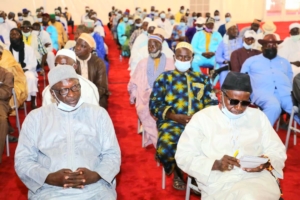By Ismaila Sonko

July 19, 2021
Many Gambians believe that traditional rulers in the country have lost their integrity as they are easily manipulated by politicians. In a chat with The Progress Newspaper, Abdoulie Dem, a Political Science student at the University of The Gambia (UTG) while emphasising that chiefs and alkalolou are important persons in the society with crucial roles to play in the villages and districts, faulted their participation in politics.
He said they are supposed to be neutral but are often used by politicians to win votes. “Most of the traditional rulers believe that if they don’t involve in politics or be loyal to the sitting president they may lose their chieftaincy or alkaloluship,” he added.
Another concerned Gambian, Alhagie Kongira, said the functions of chiefs include dispute resolution, codification of customary law, arrangement of ceremonies and festivals, organisation of communal labour and promotion of socio-economic development, but in The Gambia the chiefs and alkalolu are easily manipulated by the politicians especially by the sitting president, to serve his interest.
“Chiefs have been involved in the development of their areas since pre-colonial times but nowadays they were not participating in any development project in their various areas,” he further stated.
Yankuba Jammeh, a businessman, averred that there are varying degrees to which chiefs can circumscribe tradition. He said: “More powerful chiefs have a greater say in which traditions should be considered useful or redundant, but they have lost all those powers because of their involvement in politics and as a result have lost their integrity.”
Lamin Jobe, a historian, defined the role of Seyfolu and alkalou, saying they are mediators and arbitrators in dispute resolution and crime management as well as symbols of people’s voice, which require them to maintain a non-partisan political life style.
Jobe further noted that though chiefs could exercise their voting rights, the executive has the power to hire and fire them. He said that as important members of the state apparatus, they have to preside over all sorts of state functions at district and village level. He also stressed that their role as adjudicators requires them to respect diverse political opinions in a democratic system.
He further stated that by virtue of their traditional role, chiefs and alkalolou are not supposed to participate in politics or accept political positions, or even have any political ambition or clout.
He added: “Chieftaincy structures of governance exist outside democratic governance structures. The principle of cultural moral and ethical order dictates that chiefs do not participate in political activities. In this context, democratic governance structures could significantly improve by reviving and infusing legitimacy laden instruments of traditional governance into modern democratic governance in The Gambia.
Rather than politically force and keep chiefs out of democratic governing structures, chieftaincy could be structured into the governing process as key stakeholders in ways that allow political officeholders to benefit from traditional popular support for chiefs.”

